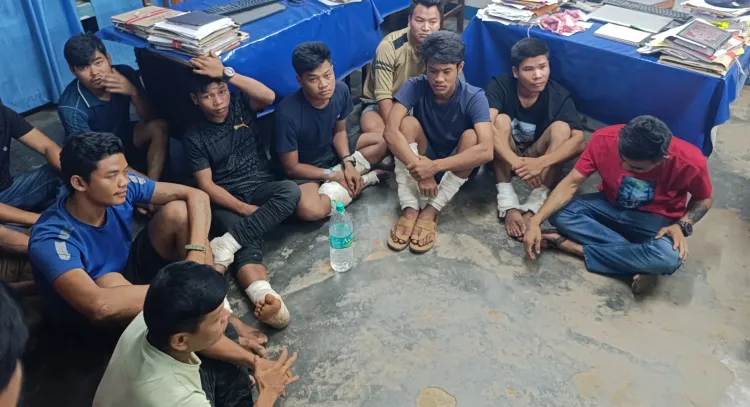Why Did Tripura Police Detain 13 Members of a Bangladeshi Outfit?

Synopsis
Key Takeaways
- 13 individuals from a Bangladesh-based organization were detained.
- They crossed into India seeking medical treatment.
- Their repatriation is imminent, coordinated by the BSF and MTF.
- The conflict in the Chittagong Hill Tracts continues to impact local communities.
- Cross-border migration remains a sensitive issue for Tripura.
Agartala, June 4 (NationPress) The Tripura Police have detained 13 individuals affiliated with a Bangladesh-based organization, which includes two women. They are set to be repatriated to their homeland shortly, according to an official statement released on Wednesday.
A police official revealed that these individuals were apprehended following police operations at a rented residence in Biswas Para, located under the Amtali Police station in West Tripura late on Tuesday evening.
Throughout the day, senior police officials conducted interrogations of the 13 detainees, who are suspected to be members of a Chakma community organization from the Chittagong Hill Tracts in southeastern Bangladesh.
“Following their questioning, the police have transferred them to the Mobile Task Force (MTF), which in turn handed them over to the Border Security Force (BSF). All 13 individuals will soon be sent back to Bangladesh by the BSF and MTF,” the official stated.
Sources indicated that these individuals sustained injuries during armed confrontations with a rival faction in Panchari, located in the Chittagong Hill Tracts (CHT) of Bangladesh the previous week. Seeking medical attention for their injuries, they crossed into India, where Tripura Police subsequently detained them.
Preliminary reports suggest that the group illegally traversed the India-Bangladesh border at Raishyabari in the Dhalai district following a violent clash on the Bangladeshi side. Many members were seen with bandages on their limbs.
The armed conflict involving the ‘Shanti Bahini’ in the CHT concluded with a bipartite agreement signed between the Parbatya Chattagram Jana Samhati Samiti (PCJSS) and the Bangladesh government on December 2, 1997.
The ‘Shanti Bahini’ had been advocating for a sovereign CHT for indigenous tribes like the Chakma, Mog, and others in the hilly region.
Reports have emerged of attacks on indigenous communities in the CHT by the Bangladesh Army and illegal settlers following the downfall of the former Prime Minister Sheikh Hasina-led Awami League government on August 5, 2024.
The Buddhist Chakmas predominantly inhabit the CHT in southeastern Bangladesh, as well as the Chin and Arakan provinces of Myanmar and several states in India's northeastern region.
Indian Chakma leaders have called for the enforcement of the CHT peace accord to safeguard the rights of the tribal population in the hill region.
With an 856 km border adjacent to Bangladesh, Tripura is encircled on three sides by the neighboring nation, rendering the northeastern state particularly vulnerable and sensitive to issues related to cross-border migration.










